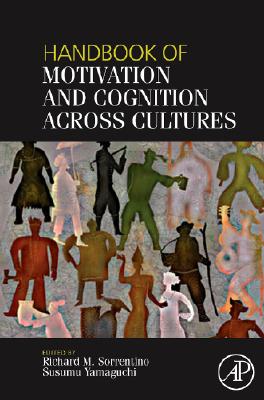In recent years there has been a wealth of new research in cognition, particularly in relation to supporting theoretical constructs about how cognitions are formed, processed, reinforced, and how they then affect behavior. Many of these theories have arisen and been tested in geographic isolation. It remains to be seen whether theories that purport to describe cognition in one culture will equally prove true in other cultures. The Handbook of Cross-Cultural Motivation and Cognition is the first book to look at these theories specifically with culture in mind. The book investigates universal truths about motivation and cognition across culture, relative to theories and findings indicating cultural differences.
Coverage includes the most widely cited researchers in cognition and their theories- as seen through the looking glass of culture. The chapters include self-regulation by Tory Higgins, unconscious thought by John Bargh, attribution theory by Bernie Weiner, and self-verification by Bill Swann, among others. The book additionally includes some of the best new researchers in cross-cultural psychology, with contributors from Germany, New Zealand, Japan, Hong Kong, and Australia. In the future, culture may be the litmus test of a theory before it is accepted, and this book brings this question to the forefront of cognition research.
* Includes contributions from researchers from Germany, New Zealand, Japan, Hong Kong, and Australia for a cross-cultural panel
* Provides a unique perspective on the affect of culture on scientific theories and data
| FindBook |
有 1 項符合
Handbook of Motivation and Cognition Across Cultures的圖書 |
 |
Handbook of Motivation and Cognition Across Cultures 作者:Sorrentino,Richard M.(EDT)/Yamaguchi,Susumu(EDT) 出版社:Academic Pr 出版日期:2008-06-01 語言:英文 規格:精裝 / 600頁 / 2.5*15.9*23.5 cm / 普級 / 單色印刷 |
| 圖書館借閱 |
| 國家圖書館 | 全國圖書書目資訊網 | 國立公共資訊圖書館 | 電子書服務平台 | MetaCat 跨館整合查詢 |
| 臺北市立圖書館 | 新北市立圖書館 | 基隆市公共圖書館 | 桃園市立圖書館 | 新竹縣公共圖書館 |
| 苗栗縣立圖書館 | 臺中市立圖書館 | 彰化縣公共圖書館 | 南投縣文化局 | 雲林縣公共圖書館 |
| 嘉義縣圖書館 | 臺南市立圖書館 | 高雄市立圖書館 | 屏東縣公共圖書館 | 宜蘭縣公共圖書館 |
| 花蓮縣文化局 | 臺東縣文化處 |
|
|
圖書介紹 - 資料來源:博客來 評分:
圖書名稱:Handbook of Motivation and Cognition Across Cultures
|










